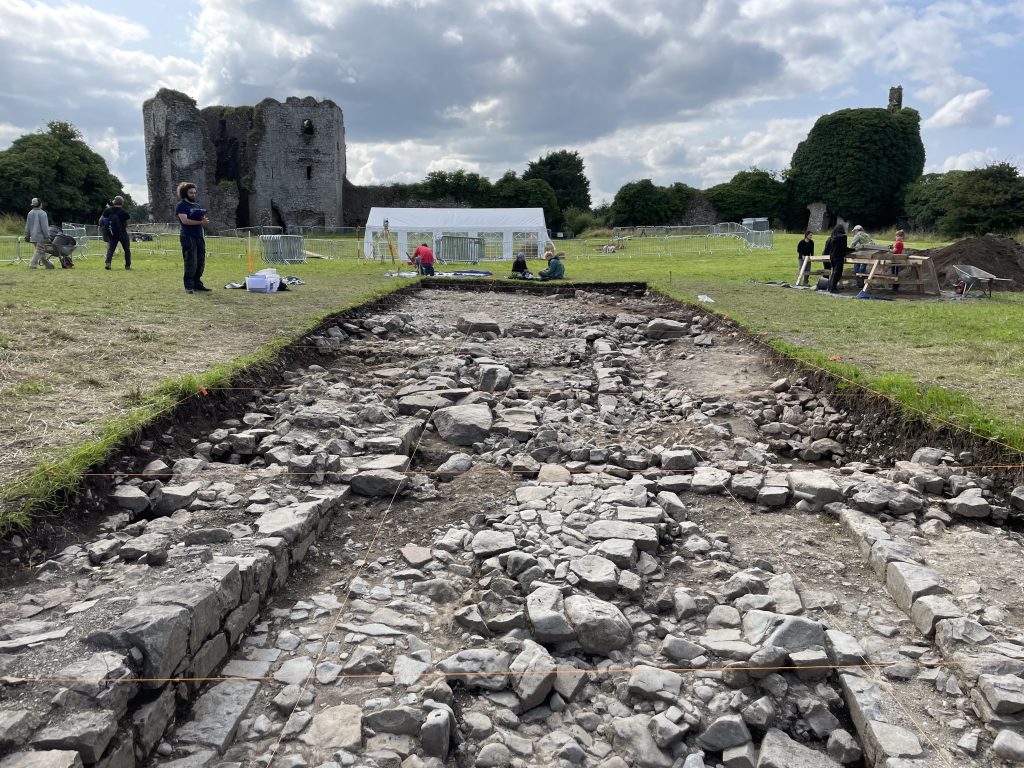
Kade McGovern is a junior in Cabot House on an honors track studying social anthropology and archaeology. During summer 2023, Kade participated in a research assistantship, joining the “Castles in Communities” Archaeological Program and the dissertation research of Harvard Ph.D. candidate Andrew Bair.
Where did you go?
It was truly an honor to conduct archaeological research this summer in Ballintober, County Roscommon, Ireland for it was extremely formative to my educational goals and my perception of anthropological study. The work with the Castles in Communities (CIC) program and with Harvard Ph.D. candidate Andrew Bair, primarily working on the archaeological excavation of the 12th century Ballintober Castle and the geophysical surveying of the medieval Irish “ringfort,” was truly a pleasure. As a member of CIC and as a research assistant to Andrew Bair, I learned numerous geophysical surveying technologies, gained a holistic understanding of archaeological fieldwork, and most importantly, I became closer to my Irish culture and ancestry.
What did you do?
Working with Castles in Communities, I learned how archaeological excavations operate and their numerous components. I learned valuable skills such as how to set proper excavation grids, how to work efficiently and remain organized while excavating, and most importantly, how to differentiate and interpret different archaeological contexts, stratigraphic layers, and artifacts found. While excavating, it is crucial for the archaeologist to record everything, whether it is changes in soil composition, the placement of stones and rocks found in the unit, and the locations and details of any artifacts found. Personally, my favorite artifact I found during the dig was a rusted knife blade from the 1700s. In addition to the dig, I also learned how to process, record, and organize artifacts into extensive excel databases while working in our project’s lab.

What was your biggest takeaway from your research experience?
The part of the archaeological research conducted this summer I valued most was how our findings built better connections between people and their Irish heritage and culture. Hidden in the soil under the modern village of Ballintober is the detailed story of those who have lived there throughout history. Sharing our archaeological finds was heartwarming for it brought the locals closer to the lives of their ancestors. Personally, I also now have a better understanding of my own Irish roots. My grandmother was born in a small Irish village in County Cavan, which neighbors the location of our research in County Roscommon. Because of the similarities between Roscommon and Cavan, both being rural agrarian terrains, every archaeological find served as a window for me to view what life was like for my ancestors throughout history as well.
Through the research this summer, I have seen the changes taking place in modern archaeological practice. I experienced the tedious, traditional practice of archaeological excavations alongside the more modern application of technologies such as geophysics.
How did you find this research assistantship?
I came upon the opportunity of helping Andrew Bair with his dissertation research through the first class I took in anthropology: GenEd 1044 – Deep History. As a first semester sophomore at the time, this class was my favorite course I had taken, and it was the reason I chose to study anthropology. Andrew happened to be one of the Teaching Fellows for the course, and after hearing about my interest studying anthropology, he invited me to join him in his research that summer. After finding the easily available funding opportunities through Harvard, I knew this was how I wanted to spend my summer.

How did you pay for the experience?
I am unbelievably thankful to MCS and the Weissman International Internship Fund for their generosity in funding my wonderful summer in the captivating landscapes of Ireland. The funding not only made this journey possible, but also enriched my academic and personal growth in ways I could never have imagined. I am truly thankful.
Resources for research experiences:
- Check out the Office for Undergraduate Research and Fellowships (URAF)
- Review the “Research” section on the MCS Harvard-Funded Summer Experiences page
- Review the details for MCS-funded independent internship or research assistantship funding (application deadline: February 29, 2024)
Resources for your summer search:
- Read 5 questions to ask yourself as you think about summer
- Review the 2024 Summer Opportunities Guide
- Talk to an MCS adviser to figure out what might be the best fit for you
- Check out the MCS Find and Apply for Summer Opportunities Funding page



